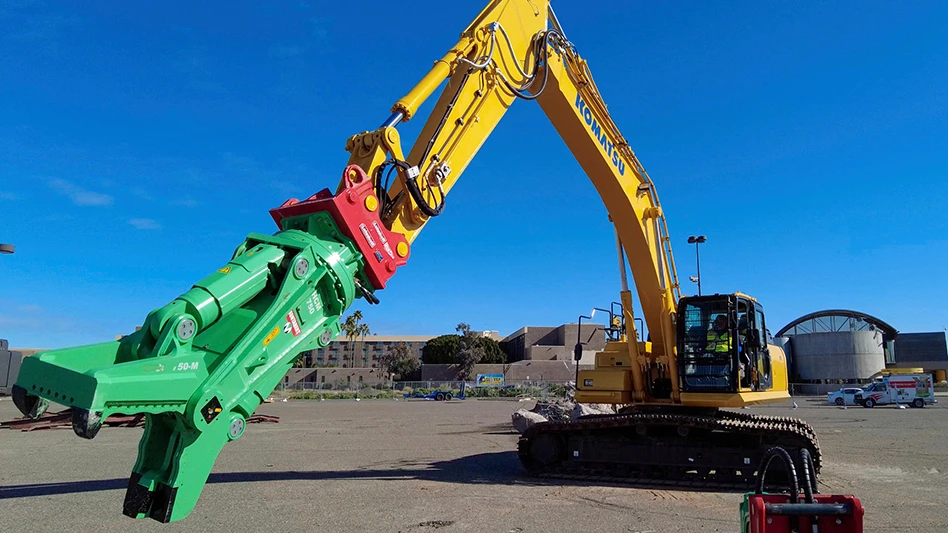
1. What solutions does CDE provide?
The solution that CDE provides is that we can help operators turn what is widely considered a waste product into a high-specification construction product through our wet processing equipment. Not only that, but we can do this dependably, creating products with a uniform spec day in and day out.
This might seem like new technology, but CDE has been doing this on-site in the U.K. and throughout Europe for over 20 years. I think the U.S. market is ready to embrace this because we’re helping take highly complex urban waste that is going to landfill and taking up airspace, and we can help recyclers create a market for it. So, it makes sense from a business and profit perspective, and it makes sense from an environmental perspective—that’s the solution that CDE brings to the table.
2. What advantages does wet processing offer?
U.S. recyclers are already investing in dry screening processes and crushing processes for recycled concrete, and that works really well and there’s a great industry there. But if you wanted to take that recycled concrete product and make it a higher specification aggregate or sand, you can’t do that with more traditional dry screening methods. You need a wet process for that. Crushed concrete is one material stream that wet processing is ideal for, but other streams include excavated soils, either clean or contaminated; construction and demolition waste; rubble; and hydroexcavated materials. There is a wide spectrum of materials that can be wet processed. And while some of them can be processed through more traditional techniques like dry screening or crushing, once you get into materials that are a bit more complex in terms of having higher moisture contents, organics, clay or contamination, then you need a wet process to efficiently, accurately and consistently clean that to create a dependable, reusable product.
3. What are the markets for wet processed materials?
The markets for wet processed materials have evolved over time. Where originally it might have been used for pipe bedding, subbases and road fill, more recently it has been used in recycled asphalt in places ranging from Australia and Europe to Long Island, New York. It’s also being used in concrete production for molds and inserts as well as nonstructural concrete products. Ultimately what we want to do is make wet processed materials available so they can be used freely with asphalt or concrete applications. How wet processed material is used and its markets depend largely on local supply and demand of virgin materials. Obviously, between production cost and transportation issues for raw materials, wet processed materials can help fill a need.
4. What makes CDE a leader in the wet processing industry?
Through blood, sweat and tears, we’ve worked hard at CDE to perfect wet processing. We’ve done this through tireless innovation and improvement. As a business, we only wet process. We don’t dry screen. We don’t crush. We don’t do all of the things that many others do. We solely focus on and specialize in one thing. And once you do that, you have no choice. You either become an expert or you become extinct.
5. How does CDE work with customers to ensure product meets their needs?
CDE will only enter into a contract with our customer if it has a clear, detailed performance guarantee. More than the equipment itself, that is what we sell. When we work with customers and tell them they can expect to process a certain amount of material and generate products with a certain spec, that is exactly what we will deliver. We’re an end manufacturer and we don’t sell through dealers—customers buy directly from us and deal directly with us. So, when we offer a performance guarantee for a customer regarding the spec and consistency of the product, CDE will work tirelessly until we’ve met that performance guarantee. That’s probably the most important thing: We’re directly accountable, we’re working with customers face to face, and we stand behind everything we do to make sure clients are getting exactly what they expect.
 | The Garden Center Conference & Expo, presented by Garden Center magazine, is the leading event where garden retailers come together to learn from each other, get inspired and move the industry forward. Be sure to register by April 17 to get the lowest rates for the 2025 show in Kansas City, Missouri, Aug. 5-7.
|

Explore the May 2021 Issue
Check out more from this issue and find your next story to read.
Latest from Construction & Demolition Recycling
- Radius loses money, says merger on track
- Cielo investor requests annual meeting
- CDE sets up washing plant on Long Island, NY
- NWRA: NIOSH cuts a step in the wrong direction
- Ferrous price hikes could be poised to pause
- Northstar secures 15-year lease extension for asphalt shingle recycling facility
- Greenwave asks for SEC filing extension
- Construction Plastics Initiative lines up projects






